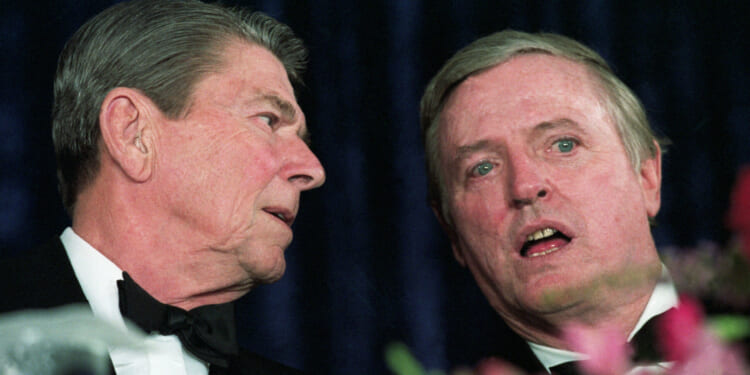In the earlier decades of the Public Broadcasting Service, conservatives could feel that they had some fraction of a platform on William F. Buckley Jr.’s “Firing Line.”
That PBS presence no doubt spurred the makers of the “American Masters” series to offer a two-hour program titled “The Incomparable Mr. Buckley.” In the opening credits, they typed in “Insufferable” first, then crossed it out. That word reflects the view of the political and financial base of PBS.
Fans of Buckley might enjoy the video clips of Buckley jousting with the elites in the 20th century, but the style of this show was annoying in that whenever experts were speaking, they were entirely off-screen.
This documentary by Barak Goodman is neither a valentine to Buckley, nor a fair and balanced recitation of his life and times. Conservatives are interviewed, but the final product carries the distinct odor of PBS’ liberal arrogance.
In the tainted timeline of this program, Buckley triumphs with the election of Ronald Reagan and then the end of the Cold War, and then it’s all downhill for the troglodytes on the Right.
Historian Geoffrey Kabaservice speaks over footage of Newt Gingrich and Rush Limbaugh about conservatism being taken to an extreme as the Republicans took Congress in 1994.
Gingrich, he claims, “teaches Republicans to talk in a new way about Democrats being a source of infection and disease and disloyalty and decay.” Then there’s footage of Limbaugh making fun of the “ugly broads” of feminism.
Over ominous music implying villainy, Kabaservice argues, “Buckley did endorse Newt Gingrich and Rush Limbaugh. At some level, he understood that politics requires emotion, as well as intellect, and maybe it requires dark emotions and even hatreds.”
This would match the spirit of PBS’ “Firing Line with Margaret Hoover,” where the liberal Republican puts on guests like journalist Tim Alberta, who recently denounced the Limbaugh show as poisoning Christians with “an unceasing stream of venom and ugliness and hostility, antagonism, hatred.”
Leftists have an annoying habit of thinking fear and loathing and ugliness and venom are somehow unique to the Republican half of America. They, by contrast, are apparently all sugar and spice and everything nice.
Have they watched five minutes of “The Reidout” or “The View”? Both sides (and center-huggers like Kabaservice) are capable of love and hatred, comfort and fear, civility and incivility.
But on PBS, they must locate experts to slam Buckley for “tolerating and sometimes even encouraging some of the nastier, more extreme aspects on the Right … by the end, it was clear the nastier forces had won out.” There’s no name on screen to figure out who’s the mudslinger here.
PBS can never be judged for encouraging the nastier, more extreme aspects of the Left, because in their bubble, no one is ever nasty or extreme where they reside, in a perfect Eden of politics.
Kabaservice returns for the final pitch on that “dark side” of the conservative movement, which was “white Americans” didn’t like “change” (because they were racists, apparently): “Buckley understood that it was part of his role to keep a lid on the dark energies that fueled the conservative movement, but not to repress them entirely, because it was those kind of resentments that he was drawing on that gave conservatism its power as a movement.”
Once again, PBS thinks the Democrats get their power from warm wellsprings of idealism and compassion. The Republicans get theirs from nurturing racism, sexism, homophobia and xenophobia.
Watching this program gives this conservative one overwhelming reaction: I want my involuntary contributions to PBS refunded. Insult me with someone else’s money.
COPYRIGHT 2024 CREATORS.COM












